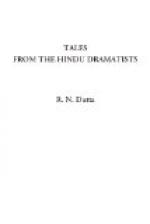No one responds. No voice is heard; only horrible figures are seen playing around him. After a while, a hermit comes and says.
“I am a hermit. I have resolved to practise some mantras. I have come to know everything about you by my powers of yoga. You are a king and you should protect me from the demons that disturb my meditations.”
The king most humbly submits, “My body is not my own; I have sold it to the lord of the Chandals. How can I forsake my duty to my lord to save you?”
The hermit says, “come and help me if I ever suffer extreme distress.”
The king replies, “If I can ever help you without detriment to the business of my lord, I am ready to do it.” The hermit retires, and after a short time he returns; and says,
“By your help I am now versed in all mantras. I am prepared to give you such a mantra as by its virtue you will be able at once to repair to Heaven. You need not suffer hell by slavery to a Chandal.”
The king replies, “Many thanks for your kind offer. But how can I accept your offer as this body belongs to a Chandal? I will not go anywhere before death.”
The hermit says, “Then take this money and deliver your wife.”
The king thankfully declines the offer with the observation, “I have sold my queen in my hour of need. To buy her back is not in my power.” The hermit soliloquizes,
“Blessed is Maharaja Harischandra! What fortitude! what wisdom! what generosity! what a sense of duty! The world has never produced a nobler man. A tempest shakes even the mountains, but behold! this noblest specimen of humanity is not moved by the severest of afflictions!
It is morning. The birds are singing. The sun is up in the horizon. The king is sitting on the banks of the Ganges. He is thinking of his fate when he hears a female voice crying. He approaches the lady. The scene is horrible. An unfortunate lady, the queen Saibya who had been deserted by her husband, has come to burn her son, the support of her life. She was serving as a slave in the house of the Brahmin who had bought her. Her son Rohitashya, was stung by a deadly poisonous snake. No body would help her. She has come to the burning-ground to burn the dead body of her son. The queen weeps and faints. The king stares at the face of the corpse for a long time and at last recognises his dead son. He too faints. After a long time he recovers, and finds that the queen




